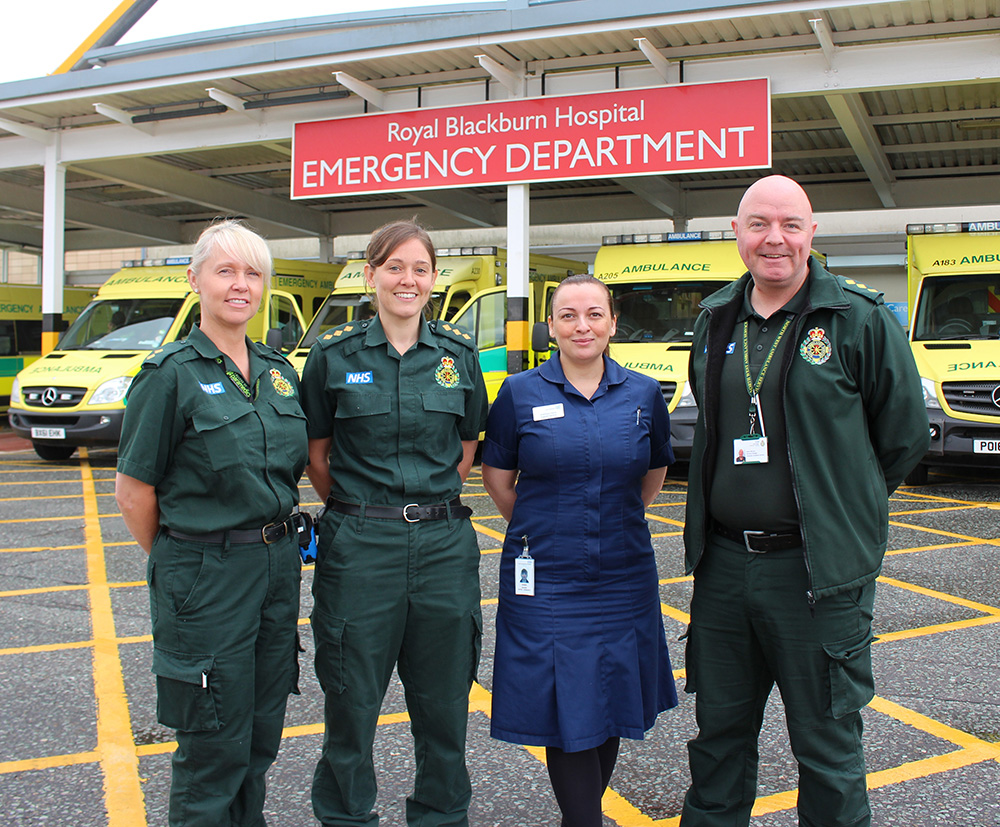
Pictured: Community Sister Gemma Davies (2nd from right) from the East Lancashire Home First service joins NWAS Urgent Care Team members Amanda Fisher, Rebekah Gunn and Simon McCrory to celebrate the new partnership
Health bosses from East Lancashire Hospitals NHS Trust, Lancashire Care NHS Foundation Trust, and the North West Ambulance Service NHS Trust (NWAS) have been working together to further improve patient access to treatment and prevent unnecessary hospital attendances.
From 29 April 2019, NWAS is able to directly refer patients who need care that could be provided at home to ‘Home First’. The multi-disciplinary service is provided by the Intermediate Care Allocation Team, the Intensive Home Support Service and the Rapid Assessment Team, with a ‘home first’ philosophy. This means that patients with needs that can be met at home, who have an ambulance called for them, won’t have to be admitted to hospital at all to receive their care. Most people would prefer to have their care and treatment provided from the comfort and convenience of their own home wherever possible.
Home First is an existing service, led by multiple organisations under the ‘Together a Healthier Future’ initiative. It provides integrated health and social care across Pennine Lancashire. Many patients have already successfully used the service through referrals from their GP or other health professional.
By thinking ‘home first’, hospital admissions and attendances are avoided, and people won’t be required to wait in A&E with needs that could be managed at home. The service also helps to prevent people staying in hospital for longer than they need to by providing support at home to assist recovery.
This new pathway recognises that the best place for recovery and recuperation is at home and ensures that patients are not admitted to hospital unnecessarily. Those referred directly to Home First by the ambulance service will be assessed within two hours, and these visits will identify areas where the patient requires support. This can include clinical assessments, diagnostics and prescribed treatment plans by Advance Nurse Practitioners, and social care assessments to understand where help is required for cooking meals, washing and dressing.
Rapid Responsive Therapists can assess where equipment and/or referrals to additional services are required, such Community Physiotherapy, or the District Nurse Team.
Rebekah Gunn, Area Manager of the Urgent Care Development Team at North West Ambulance Service NHS Trust, said: “When a patient is safely treated at home, it can be hugely beneficial. They will get the most appropriate care in an environment that’s comfortable for them, it reduces the need for A&E admissions which can bring infection risks to vulnerable people and it also frees up vital emergency resources.
“By working together with our NHS colleagues to provide a joined up service for patients we are able to give much more streamlined care for their physical, social, emotional or mental health needs.”
Tony McDonald, Deputy Director of Operations at East Lancashire Hospitals NHS Trust, added: “We are delighted to be extending the Home First service, as we believe it is much better for patients who can receive care at home instead of in hospital. Of course, each case will be carefully considered and anyone who requires inpatient care will be admitted to hospital“.
“This is a great example of organisations across Pennine Lancashire working together to provide the best care for residents, in the most appropriate setting.”


